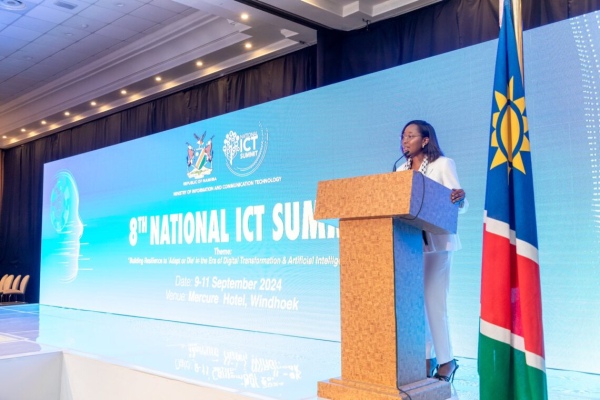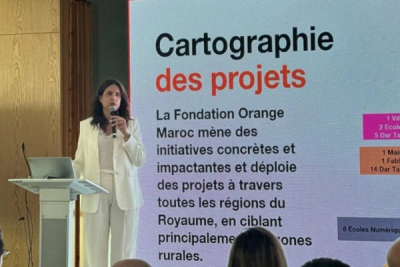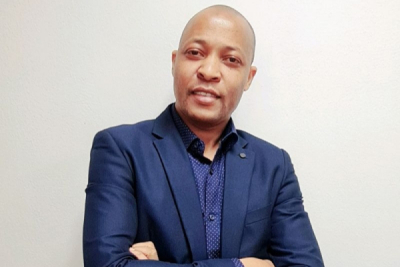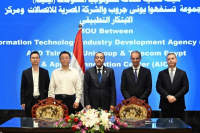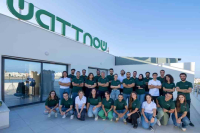In recent years, fintech has rapidly grown across Africa. In Cameroon, Site Antipas is a leading figure in this new wave of tech entrepreneurs shaping this segment.
Site Antipas (photo) is a Cameroonian computer engineer and tech entrepreneur, co-founder, and CEO of fintech startup Noupia.
Founded in 2020, Noupia offers Cameroonians a seamless way to create and manage virtual credit cards, enabling users to make online purchases and send and receive money. Compatible with Apple and Google Pay, these virtual cards, which can be topped up via Mobile Money, are widely used for paying for services like Netflix subscriptions, and Facebook ads.
Noupia also simplifies bill payments in Cameroon, covering services like electricity, water, and Canal+, and allows users to purchase phone credit. Additionally, through its Noupia Actu feature, users can stay updated on financial news. The startup provides other services as well, including Ixtina, a digital platform where Cameroonians can offer various services.
Apart from his role at Noupia, Site Antipas is the lead web developer for First Hair, a company specializing in hair care products. He developed the company's e-commerce platform, facilitating online sales and deliveries of their products.
A graduate of HIBMAT University in Buea, Site Antipas earned his degree in computer engineering in 2016. He began his career in 2015 as a full-stack freelance developer and worked as a web developer for the Catholic University Institute of Buea from 2018 to 2022.
Melchior Koba
The Namibian government has made digital transformation a cornerstone of its socioeconomic development. To ensure the security of individuals and systems, the administration plans to implement robust safeguards.
amibia is on the verge of implementing regulatory frameworks for cybersecurity and data protection. Minister of Information and Communication Technology (ICT) Emma Theofelus announced on Monday, September 9, that two draft laws are nearing completion.
Speaking at the launch of the eighth National ICT Summit, Theofelus stressed the importance of these laws in a rapidly evolving digital landscape. "To thrive in this new era, we must not only adapt to technological changes but also build a resilient framework capable of keeping pace with advancements," she stated.
The cybersecurity and data protection laws are part of the National Digital Strategic Plan for 2025-2029. Their development comes amid a fast-paced digital transformation, marked by the rapid adoption and diversification of ICT usage. For instance, mobile internet subscriptions in Namibia rose from 934,000 in Q2 2016 to 1.532 million in Q2 2024, a 64.1% increase. By the end of June, the number of mobile subscribers had reached 2.47 million.
This rapid growth in digital adoption brings new challenges, particularly the rising threat of cybercrime. According to Interpol’s "African Cyberthreat Assessment Report 2024," cybercriminals are using increasingly sophisticated methods to exploit vulnerabilities in individuals, organizations, and states.
Strengthening cybersecurity and personal data protection is essential to achieving the Namibian government’s digitalization ambitions. The government aims to leverage digital technologies to drive economic growth, promote social inclusion, and foster overall societal progress.
“From e-government to digital health and education, these technologies offer new ways to enhance service delivery and improve the quality of life for our population. We must harness these technologies to make government services more accessible, efficient, and responsive to citizens' needs,” added Emma Theofelus.
Isaac K. Kassouwi
Digital transformation, particularly in healthcare, is crucial for development. Implementing Digital Health Systems is expected to improve access to medical care and reduce inefficiencies. By tracking pharmaceuticals using digital tools and AI, the government can better manage resources and ensure that essential medicines reach patients, thereby improving public health outcomes.
Zambia has begun rolling out Digital Health Systems in hospitals nationwide to enhance healthcare delivery and ensure the availability of essential medicines. The project was announced on September 4 by the Ministry of Science and Technology. In collaboration with the Ministry of Health, it aims to digitize healthcare services and combat drug pilferage.
At the launch of the project in Gwembe, Southern Province, Minister of Science and Technology Felix Mutati highlighted the role of modern technology in transforming healthcare. He noted that hospitals would now use digital tools to extend healthcare access to more Zambians. Additionally, the system will track pharmaceuticals from procurement to patient use, aiming to curb drug theft in healthcare facilities.
Access to basic healthcare services in Zambia is unevenly distributed between provinces and between urban and rural areas. According to the International Insulin Foundation report on Zambia’s Health System, in urban regions, 99% of households are located within 5 kilometers of a health facility, whereas in rural areas, only about 50% of households have similar proximity to healthcare facilities. The digitization initiative aims to bridge this gap by utilizing digital tools to reach more citizens, especially in underserved rural regions
Meanwhile, drug theft has been a longstanding issue in the Zambian health sector whose national drug stock level was 53.1%, below the World Health Organization’s minimum threshold of 70%. Transparency International highlighted the concerns in 2020 when Zambian journalists uncovered irregularities in a US$17 million health kit procurement. By digitizing health services and leveraging AI technologies, the government improves accountability in the pharmaceutical supply chain, ensuring drugs are tracked from procurement to patient use, ultimately boosting transparency and curbing mismanagement.
This move aligns with Zambia’s ‘Health Information Systems Strategy 2022 – 2026’ vision of “a national health information system that harnesses digital innovations to support evidence-based decision making for quality and equitable health services.”
Hikmatu Bilali
Morocco is facing a persistent problem of school dropouts, particularly in rural areas. Efforts are underway to reverse this growing trend.
Orange Maroc Foundation announced on Thursday plans to equip 55 new schools with computer equipment for the 2024-2025 school year as part of its "Digital Schools" program. The announcement came during the launch of the project's second phase.
“This program aims to democratize access to digital technologies in rural primary schools, ensuring equal learning conditions for all students, regardless of their environment. Strengthening our partnership with the Ministry of National Education is further proof of our commitment to supporting the Kingdom in the successful digital transformation of Moroccan schools,” said Hind Lfal (photo), Secretary General of Orange Maroc.
Launched in 2022 in partnership with the Ministry of National Education, the project provides digital equipment, including computers for teachers, tablets for students, and online educational resources. It aims to enhance learning in rural areas, which often face challenges in accessing modern educational tools.
This initiative aligns with Orange Maroc's corporate social responsibility strategy to promote digital inclusion and combat school dropouts. According to the Moroccan Ministry of National Education, 249,458 students dropped out of school in 2022/2023, with 45.5% coming from rural areas. UNESCO estimates the economic impact of this issue in Morocco at $196 million annually.
With this new phase, 55 additional schools will be equipped, 200 teachers will receive training, and 17,000 students will benefit from the initiative. Since its launch, the program has already digitized 16 rural schools, benefiting over 4,000 students and 30 teachers.
Samira Njoya
He aims to boost intra-African trade by connecting truck owners and traders across the continent through technology. By leveraging digital platforms, he streamlines logistics and transportation, enabling businesses to move goods more efficiently across borders.
Robert Okello (photo), a Kenyan entrepreneur, is the co-founder and CEO of Rudi Trip, a company addressing the high costs and environmental impact of freight transportation in Africa. Founded in 2022, Rudi Trip connects shippers, truck owners, and drivers through a digital platform, aiming to reduce cross-border transportation costs and boost intra-African trade.
By minimizing empty trips, cutting carbon emissions, and optimizing the time spent finding cargo, Rudi Trip streamlines the logistics process. The platform matches loads with reliable trucks, offers fast payments to truck owners, and ensures transparency in the industry. The company specializes in domestic and cross-border transportation across various sectors, including grains, cement, tiles, steel, and consumer goods. Users can track the real-time location of trucks transporting their goods via the Rudi Trip app.
Prior to founding Rudi Trip, Okello gained experience in the technology and business development sectors. He holds a bachelor's degree in mathematics and chemistry from the University of Nairobi. After graduating, he worked at I Can Fly, a university guidance platform, as a business development manager. He subsequently joined Gorilla Africa BPO, a provider of tech solutions and marketing services, where he served as head of partnership development across Africa.
In 2019, Okello joined Razzo Africa, an IT services and consulting firm, as head of business development and African partnerships. He later worked as head of growth for the Middle East and Africa region at Pieme, a blockchain platform.
Melchior Koba
He is an environmentalist and social entrepreneur, dedicated to addressing issues related to solid waste. He promotes the circular economy and incorporates technology to optimize his efforts.
Allen Kimambo (photo), a Tanzanian engineer and entrepreneur, is at the helm of Zaidi Recyclers, a social enterprise dedicated to driving the transition to a circular economy. Founded in 2014, the company offers comprehensive recycling solutions, industrial waste management, and sustainability initiatives for businesses.
Zaidi Recyclers provides clients with a range of services, including safety, quality, and environmental management systems. The company also assists businesses in obtaining ISO certifications and other industry compliance standards. Through a user-friendly mobile app, clients can report available waste streams for collection.
The company handles various types of waste, including electronic and electrical equipment, car batteries, paper, cardboard, glass bottles, and plastics. To date, Zaidi Recyclers has collected over 2,200 containers and recycled 700 tons of waste.
Beyond his role as CEO of Zaidi Recyclers, Kimambo is actively involved in the Tanzanian startup ecosystem. He is a founding member of the Tanzania Startup Association and serves as a solid waste consultant for Tetra Tech. Additionally, he is an associate consultant with Adam Smith International and a project manager for the TakaNiAjira Foundation in Uganda. Kimambo also chairs the Tanzania Recyclers Association.
Kimambo holds a bachelor's degree in chemistry and processing from the University of Dar es Salaam. In 2021, he furthered his expertise by earning a diploma in sustainable development through the Swedish Institute Management Programme.
Melchior Koba
In September 2023, Burkina Faso's government introduced an online platform for obtaining criminal records. The service was initially launched in Ouagadougou and is expected to expand to all regions of the country.
Justice and Human Rights Minister Edasso Rodrigue Bayala announced on Friday the nationwide expansion of the country's online criminal record system. The initiative aims to streamline the process of obtaining this vital administrative document for citizens.
The e-criminal record service was initially launched in September 2023 in the Ouaga I and II high courts. Following a successful pilot phase, the government decided to extend the service to all regions of Burkina Faso.
“Online requests have reached around 105,000 since the platform's launch. This demonstrates significant interest, as the system reduces costs, makes justice more accessible, and curbs corruption in the judicial sector,” Minister Bayala explains.
The expansion of the e-criminal record service aligns with the government's National Strategy for the Modernization of Public Administration (SNMAP) 2021-2025. One of the key objectives of the SNMAP is to enhance the accessibility of public services through information and communication technologies.
According to the United Nations' E-Government Development Index, Burkina Faso ranked 166th out of 193 countries in 2022, with a score of 0.3476.
Adoni Conrad Quenum
An IT specialist by training, he uses his skills to serve his country, Senegal. He is behind various technological solutions in sectors such as finance and mobility.
Mouhamet Mbow (photo), a Senegalese IT specialist and entrepreneur, is the founder and CEO of InTech Group, a tech company that focuses on web and mobile development as well as software deployment. Launched in March 2016, InTech has grown into a dynamic startup offering diverse technological solutions in sectors like finance and mobility.
InTech’s journey began with the creation of Samataxi, a real-time, geolocated taxi-hailing app. In 2019, the company rebranded to InTech following the launch of InTech API, an aggregation, distribution, and management solution for payments, which has since become the company’s core service.
In July 2019, InTech launched Yonema, a platform that allows users across Africa to recharge mobile money accounts using a bank card. Two months later, it introduced Pointech, a geolocated time-tracking solution for businesses to better manage employee attendance.
In 2020, InTech continued expanding with the launch of PayTech, a solution offering businesses a simple, streamlined payment experience for their clients, and InTech SMS, a gateway for sending personalized SMS messages from apps or software.
Most recently, in January 2022, InTech launched PayTick, a platform that enables users to create, sell, and manage event tickets online.
Before founding InTech Group, Mbow launched ReveiL Ton Style in 2012, an online fashion store, and co-founded the news site DakarFlashNews in 2014. In 2016, he created Wmakit, a startup focused on web and mobile application development.
Mouhamet Mbow holds a degree in computer science from Paris-Est Créteil University, obtained in 2013. Between 2014 and 2015, he worked as a web developer and designer at Sen ID's, an innovation hub in various development fields.
In 2021, he was named Senegal's Best Entrepreneur of the Year at the second edition of the Meet Up Septafrique, organized by the digital media group Septafrique Groupe.
Melchior Koba
On September 2, the Egyptian government called on Indonesian companies to invest in the country’s burgeoning tech sector, particularly in data centers and digitalization. This move is part of Egypt’s broader strategy to accelerate its digital transformation.
On September 6, the Egyptian Information Technology Industry Development Agency (ITIDA) signed a memorandum of understanding with China's state-owned Tsinghua Unigroup. The collaboration aims to establish a $300 million fund to facilitate Chinese investments in Egypt’s tech sector.
Under the agreement, Tsinghua Unigroup and its subsidiaries will provide 60 to 70% of the fund’s capital. While the specific areas of investment were not disclosed, the agreement includes plans to build a data center, establish a research and development center for chip and system design, and develop an AI-based Arabic language model.
This initiative aligns with Egypt’s goal to attract foreign investment to boost its technology sector. In December 2023, Egypt signed an MoU with the United Arab Emirates to build data centers with a combined capacity of up to 1,000 megawatts. Additionally, Telecom Egypt secured a $600 million fiber optic investment from 4iG Group. During the 2nd Indonesia-Africa Forum on September 2, Egypt also invited Indonesian companies to invest in data centers and digitalization projects.
These investments are set to support Egypt's "Digital Egypt 2030" strategy, which aims to advance the country’s ICT sector and modernize its telecom infrastructure, positioning digital technology as a driver of socioeconomic development.
Isaac K. Kassouwi
Tunisian startup Wattnow has closed a multi-million dollar funding round led by Lateral Frontiers and 216 Capital, with support from Outlierz Ventures, Satgana, Octerra Capital, and angel investors like Karim Beguir.
Wattnow provides AI-powered, IoT-based energy management systems to help businesses optimize energy use, cut costs, and reduce emissions.
The company plans to use the new funds to expand globally, enhance its technology, and further sustainability efforts.
More...
Designed to foster knowledge-sharing and collaboration among entrepreneurs and professionals throughout Africa, it allows paid virtual sessions with various experts.
Entourage, a digital platform developed by a Beninese startup, allows entrepreneurs and professionals to book paid virtual sessions with experts across various sectors in Africa.
Launched in September 2024 by Raodath Aminou, the platform has already attracted more than 500 users. "In African environments, access to knowledge remains limited because the culture of sharing is still underdeveloped. It's essential to overcome these challenges to broaden the dissemination of knowledge and contribute to building a more prosperous Africa," said Raodath Aminou.
Unlike many modern solutions, Entourage doesn't have a mobile app. Users visit the web platform to explore expert profiles and book sessions. Experts are categorized into business development, career development, and sectoral insights.
During these virtual sessions, users can discuss a variety of topics with their chosen experts to find quick solutions to their challenges. Professionals can explore career options, seek guidance based on their qualifications, skills, aspirations, and experiences. Entrepreneurs, on the other hand, can receive valuable advice on growing their businesses or launching new projects. Entourage offers session lengths of 15, 30, 45, and 60 minutes.
A key feature of the booking process is that users provide the expert with sample questions in advance, helping the expert better understand the client's expectations. After booking, both parties receive a confirmation email with all the relevant details, followed by a reminder email the day before the session. At the end of the coaching session, both the user and the expert rate each other.
Stanislas Zézé, CEO of Bloomfield Investment Corporation and one of Entourage's featured experts, emphasized the importance of mentorship: "Mentorship is essential to guide young entrepreneurs because those who have already started businesses better understand the challenges of the business world."
Adoni Conrad Quenum
He envisions a connected and sustainable future for Africa. By harnessing the power of the Internet of Things and artificial intelligence, he aims to bring energy and internet access to every Nigerian.
Osumune Michael, a materials and metallurgical engineer, is the founder and CEO of Moon Innovations, a startup providing smart and sustainable energy solutions for Africa.
Founded in 2016, Moon Innovations leverages solar technology, artificial intelligence, and cloud computing to offer an all-in-one system that delivers electricity, internet access, and security surveillance. The company's "Solar Smart Inverter" integrates cloud storage for surveillance feeds.
According to Osumune Michael, Moon Innovations focuses on designing and manufacturing an intelligent solar inverter system that combines wireless internet, security monitoring, and solar power. "The system can be controlled and monitored remotely via a mobile app," he explains.
Michael graduated from the Federal University of Technology Owerri in 2011 with a bachelor's degree in materials and metallurgical engineering. After his studies, he worked as a materials engineer at Dunis Global Services, a local company providing engineering, construction, and procurement services, from 2015 to 2016.
In 2022-2023, he participated in the Orange Corners innovation program, where he received training in entrepreneurship. Moon Innovations was also a finalist in the Africa IoT & AI Challenge 2024, a regional competition recognizing entrepreneurs with innovative ideas in IoT, AI, and related technologies.
Melchior Koba
Nigeria is projected to need nearly 28 million skilled workers with digital expertise by 2030, according to the World Bank. To address this growing demand across various sectors, the government has implemented multiple training initiatives.
The National Information Technology Development Agency (NITDA) has launched the first phase of its "Digital Literacy for All" (DL4ALL) program, targeting the Nigerian informal sector.
In a social media post on Saturday, the agency announced the partnership with the National Youth Service Corps (NYSC) to equip citizens from all 774 local government areas with basic digital skills.
The DL4ALL program aims to increase digital literacy rates to 70% by 2027. It aligns with NITDA's "Strategic Roadmap and Action Plan 2024-2027" (SRAP 2.0), which seeks to promote digital transformation and empower Nigerians through technology.
This initial phase will cover twelve states, including the Federal Capital Territory and the states of Kebbi, Jigawa, Yobe, Gombe, Kwara, Ekiti, Osun, Cross River, Bayelsa, Abia, and Ebonyi.
The launch comes at a time of growing demand for digital skills in Sub-Saharan Africa. According to a 2021 World Bank report, Nigeria's workforce will need approximately 28 million digitally skilled workers by 2030.
Adoni Conrad Quenum
Social media is a daily staple, but it also poses complex ethical dilemmas. Balancing free speech with the fight against misinformation, hate speech, and harassment is a critical challenge.
The Democratic Republic of Congo (DRC) has begun talks with a Chinese company to implement a social media surveillance system. The agreement was signed on Wednesday by Augustin Kibassa Maliba, the DRC’s Minister of Posts, Telecommunications, and Digital Economy during the China-Africa Cooperation Forum.
While details are limited on the specifics of that agreement, the government likely aims to regulate online content in response to disinformation, hate speech, and other harmful activities. The DRC's current sociopolitical climate, including armed conflict and tensions with Rwanda, has created fertile ground for misinformation.
According to an analysis by the Collaboration on International ICT Policy for East and Southern Africa (CIPESA), this “information war” is having severe impacts on national cohersion.
According to DataReportal, the DRC had 6.45 million active social media users as of January 2024, a growth of 37.2% from the previous year. Of these users, 37.2% were women and 62.8% were men. Facebook was the dominant platform, followed by TikTok (4.44 million users), Facebook Messenger (1.15 million), Instagram (670,000), LinkedIn (620,000), and X (formerly Twitter, 253,000). This growing user base has raised the stakes for managing the flow of information online in the DRC.



